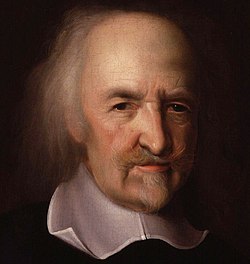Thomas Hobbes Quote
Related Quotes
Let my silence grow with noise as pregnant mothers grow with life. Let my silence permeate these walls as sunlight permeates a home. Let the silence rise from unwatered graves and craters left by bomb...
Kamand Kojouri
Tags:
abuse, abused, activism, activism poems, activist, amnesty, bellies, bombs, broken hearts, coming together
Attempts to locate oneself within history are as natural, and as absurd, as attempts to locate oneself within astronomy. On the day that I was born, 13 April 1949, nineteen senior Nazi officials were...
Christopher Hitchens
Tags:
alcohol, alcoholism, andrei gromyko, antisemitism, astrology, astronomy, beijing, birth, birthdays, breastfeeding
About Thomas Hobbes
Thomas Hobbes ( HOBZ; 5 April 1588 – 4 December 1679) was an English philosopher, best known for his 1651 book Leviathan, in which he expounds an influential formulation of social contract theory. He is considered to be one of the founders of modern political philosophy.
In his early life, overshadowed by his father's departure following a fight, he was taken under the care of his wealthy uncle. Hobbes's academic journey began in Westport, leading him to Oxford University, where he was exposed to classical literature and mathematics. He then graduated from the University of Cambridge in 1608. He became a tutor to the Cavendish family, which connected him to intellectual circles and initiated his extensive travels across Europe. These experiences, including meetings with figures like Galileo, shaped his intellectual development.
After returning to England from France in 1637, Hobbes witnessed the destruction and brutality of the English Civil War from 1642 to 1651 between Parliamentarians and Royalists, which heavily influenced his advocacy for governance by an absolute sovereign in Leviathan, as the solution to human conflict and societal breakdown. Aside from social contract theory, Leviathan also popularized ideas such as the state of nature ("war of all against all") and laws of nature. His other major works include the trilogy De Cive (1642), De Corpore (1655), and De Homine (1658) as well as the posthumous work Behemoth (1681).
Hobbes contributed to a diverse array of fields, including history, jurisprudence, geometry, optics, theology, classical translations, ethics, as well as philosophy in general, marking him as a polymath. Despite controversies and challenges, including accusations of atheism and contentious debates with contemporaries, Hobbes's work profoundly influenced the understanding of political structure and human nature.
In his early life, overshadowed by his father's departure following a fight, he was taken under the care of his wealthy uncle. Hobbes's academic journey began in Westport, leading him to Oxford University, where he was exposed to classical literature and mathematics. He then graduated from the University of Cambridge in 1608. He became a tutor to the Cavendish family, which connected him to intellectual circles and initiated his extensive travels across Europe. These experiences, including meetings with figures like Galileo, shaped his intellectual development.
After returning to England from France in 1637, Hobbes witnessed the destruction and brutality of the English Civil War from 1642 to 1651 between Parliamentarians and Royalists, which heavily influenced his advocacy for governance by an absolute sovereign in Leviathan, as the solution to human conflict and societal breakdown. Aside from social contract theory, Leviathan also popularized ideas such as the state of nature ("war of all against all") and laws of nature. His other major works include the trilogy De Cive (1642), De Corpore (1655), and De Homine (1658) as well as the posthumous work Behemoth (1681).
Hobbes contributed to a diverse array of fields, including history, jurisprudence, geometry, optics, theology, classical translations, ethics, as well as philosophy in general, marking him as a polymath. Despite controversies and challenges, including accusations of atheism and contentious debates with contemporaries, Hobbes's work profoundly influenced the understanding of political structure and human nature.
